It’s LGBT+ History Month in the UK and there are a number of events being run around the University by the Staff Pride Network and the Students’ Association. However, if you’re interested in delving into the archives to find out more about LGBT+ history in the UK then the Archives of Sexuality and Gender may be just the place to start.
Archives of Sexuality and Gender spans the 16th to the 20th century and is the largest digital collection of primary source materials relating to the history and study of sex, sexuality and gender. Documentation covering social, political, health and legal issues impacting LGBT+ communities around the world is included, as well as rare and unique books on sex and sexuality from the sciences to the humanities.

This extensive resource is made up of 3 databases, LGBTQ History and Culture Since 1940 Part I, LGBTQ History and Culture Since 1940 Part II and Sex and Sexuality, Sixteenth to Twentieth Century, which between them cover 54 collections that are international in their scope and coverage. But I want to highlight those collections that specifically look at LGBT+ history in the United Kingdom.
Gay Activism in Britain from 1958: The Hall-Carpenter Archives
Spanning the period from 1958 to 1990, this collection chronicles the activities of the Albany Trust, an organisation that was initially focused on decriminalising homosexuality and increasing social acceptance of gay people. The Albany Trust centered its work on counseling services, research, and public education, helping to steer society and the law away from older, traditional ideas regarding homosexuality.
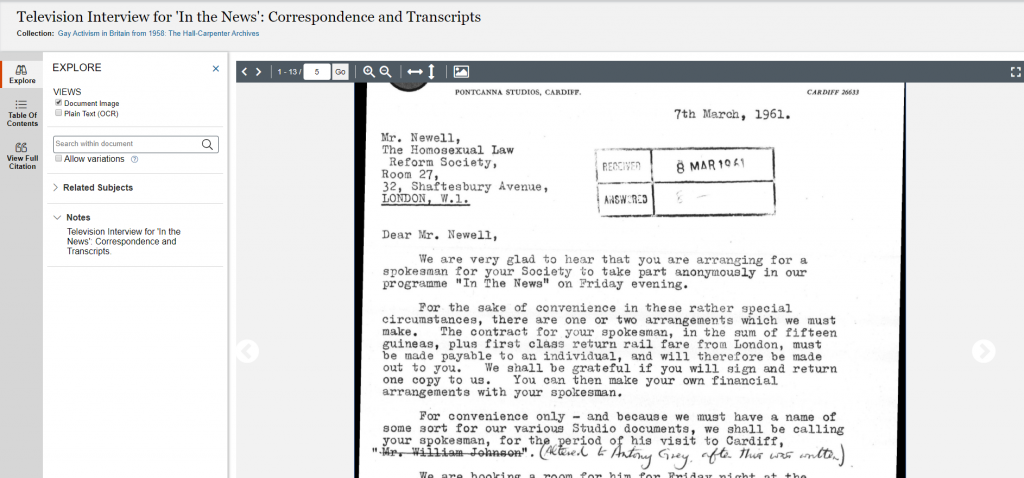
This collection includes a wide variety of materials related to the organisation and its activities. Including reports, financial papers, minutes, correspondence, publications, publicity, annual reports, conference and seminar proceedings, social worker files, papers regarding the training of youth workers and the development of sex education in the mid-1970s and much more.
This collection provides essential documentation of the decriminalisation of homosexuality and the progression of gay rights in the UK.
Sexual Politics in Britain
This collection documents the emergence of Britain’s women’s liberation and gay rights movements in the 1970s. Highlights include extensive records of Britain’s Committee for Homosexual Equality (CHE) and Scotland’s similar Scottish Minority Group, as well as every issue of Gay News, a biweekly national publication for gays, lesbians, and transgender individuals, from its first issue in 1972 through April 1983.
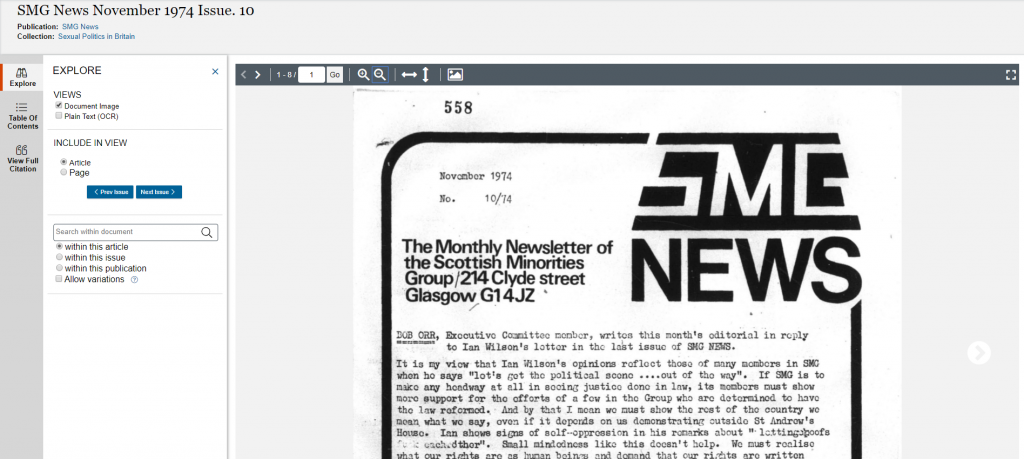
The collection also features complete or nearly-complete runs of women’s liberation periodicals that span a wide range of ideological orientations, writing styles, and focuses. While several of the mainstream women’s periodicals represented in the collection concentrate on news and coalition-building, including Women’s Struggle, the journal of Britain’s first women’s liberation organisation; the Women’s Report; Banshee, which was written by and for Irish women; and the Scottish Liberation Journal and MSprint, written by and for Scottish women.
The Wolfenden Report: Committee on Homosexual Offences and Prostitution, 1954-1957
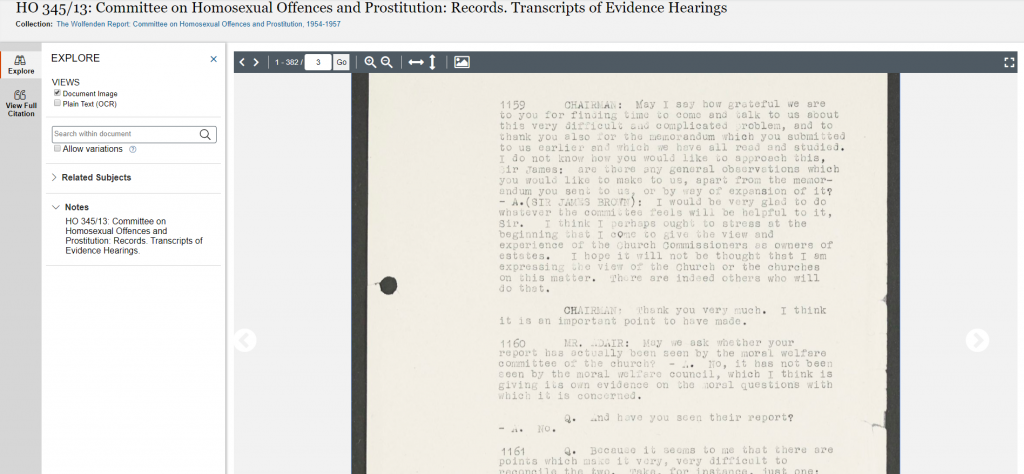
This collection contains the records of Britain’s Committee on Homosexual Offences and Prostitution which was first convened in 1954 and chaired by Sir John Wolfenden (1906–1985). Although homosexual acts had been illegal in Britain since 1885, prosecutions increased following World War II and by 1954, more than one thousand men were imprisoned for homosexual offenses. The government took up the issue only after several widely publicised prosecutions of well known men. The final report was published in 1957 and recommended that homosexual acts in private between consenting adults be decriminalised. The government rejected the committee’s recommendation and did not decriminalise homosexuality until 1967.
The testimony and committee materials represented here provide the backstory to a vital part of LGBT+ history in the UK. The collection’s files include the testimony of more than two hundred witnesses; committee papers; meeting notes and correspondence; meeting minutes; report drafts; and the final report.
The Papers of Vera “Jack” Holme
This collection documents the colorful life of British actress, suffragist, chauffeur, and World War I ambulance driver, Vera Holme. Holme (1881–1969), who went by the name “Jack,” wore men’s clothes, and had a female partner, Evelina Haverfield. In 1908, Holme joined the militant suffrage group the Women’s Social and Political Union (WSPU), acting as chauffeur for the group’s leader. In World War I, Holme and Haverfield served in Serbia and ran an orphanage there after the war.
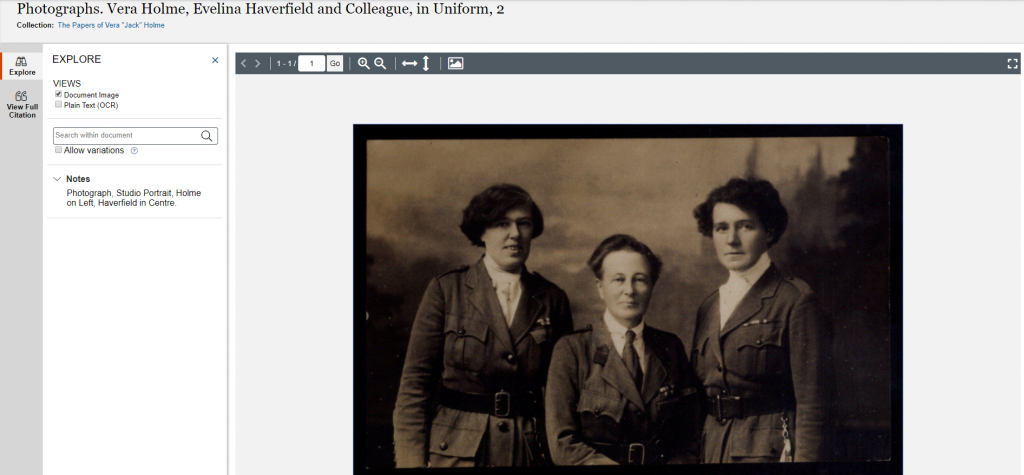
The materials collected here span the years 1899 to 2004 and include lecture notes, diaries, postcards, poems, music, flyers and pamphlets, government certificates, and press clippings. Items specific to the WSPU include speeches, programs, and photos of suffragists. Letters, reports, and photos from Serbia detail Holme and Haverfield’s experiences and ambulance work there. Photos of Holme in men’s garb and her materials concerning Haverfield depict a woman unafraid to express her gender and sexual identity despite potential disapproval.
And for something a little bit different…
The Private Case of the British Library
The Private Case of the British Library is a collection of erotic printed books, transferred from the British Museum in 1973. Established in the 1850s, it contains material that was segregated from the main British Museum Library collection on grounds of obscenity. Its name derives from it being kept originally in lockable book cases or cupboards in the Keeper’s room; items from the collection were issued to readers only with his written permission. This prevented the British Museum from violating obscenity laws and deterred theft of rare and collectable items.
Today, the Private Case contains approximately 2500 volumes but it held up to 4000 volumes in the past. This is because books were moved in and out of the collection according to the social mores of the time; the definition of obscenity has seen many changes since the mid-nineteenth-century. The Private Case is now a historical collection; its contents have been preserved, no additions have been made since 1990 and there are no longer any restrictions on its use.
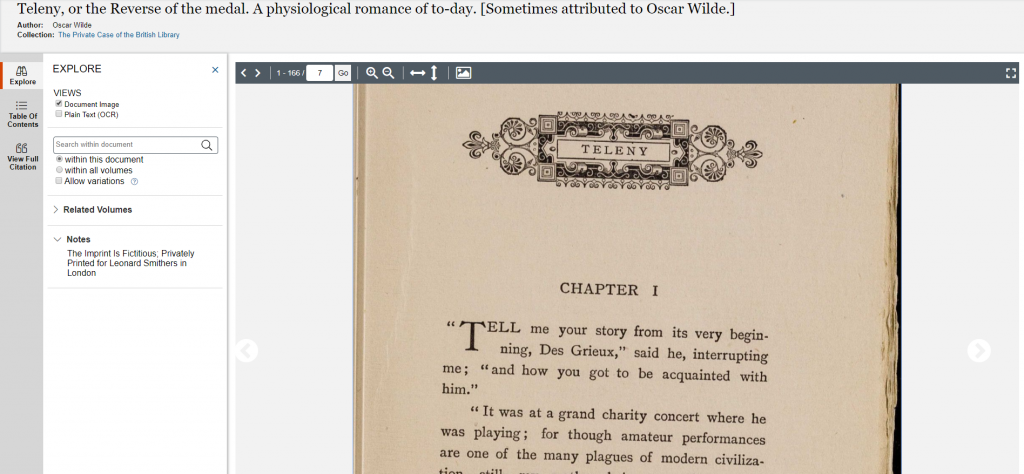
The Private Case consists mostly of erotic printed fiction and poetry, with almost all being produced by men for men. There are well known titles included e.g. Fanny Hill, works by the Marquis de Sade, etc., as well as lesser known titles. Within the collection is a copy of the limited first edition of the seminal and rare piece of gay writing Teleny, or, The Reverse of the Medal. First published in 1893 in only 200 copies, Teleny is one of the earliest homosexual erotic novels written in English. Widely attributed to Oscar Wilde, the consensus these days is that Teleny is more likely to have been a collaborative effort amongst Wilde and his circle of associates.
While these collections focus on LGBT+ history in the UK it is worth searching or browsing Archives of Sexuality and Gender in its entirety as there are other materials produced in or relating to the UK in some of the other 54 collections.
If you’re interested in delving into the Library’s own archives to find out what primary source material we hold covering LGBT+ history then the Centre for Research Collections (CRC) have LGBTQ+ Sources, an introductory list of collections for researchers interested in LGBT+ history.
CRC sources include more local collections such as the archive of the Lothian Gay and Lesbian Switchboard and the Bisexual, Lesbian or Gay Society (BLOGS) papers (BLOGS is the former name of the LGBT student society at the University of Edinburgh), as well as material related to some of the collections in Archives of Sexuality and Gender i.e. the papers of Roger Davidson, Professor Emeritus in History at the University of Edinburgh, which includes materials relating to the Wolfenden Report, notes and material of Scottish Minorities Group and Scottish Homosexual Rights Group relating to law reform 1970-80, as well as a large range of other materials and ephemera mostly used in the preparation of his 2012 book The sexual state : sexuality and Scottish governance, 1950-80, available in the Library.
You can access the Archives of Sexuality and Gender via the Digital primary source and archive collections guide, the Databases A-Z list or DiscoverEd.
Access to library databases are only available to current students and members of staff at the University of Edinburgh.
Caroline Stirling – Academic Support Librarian for History, Classics and Archaeology
